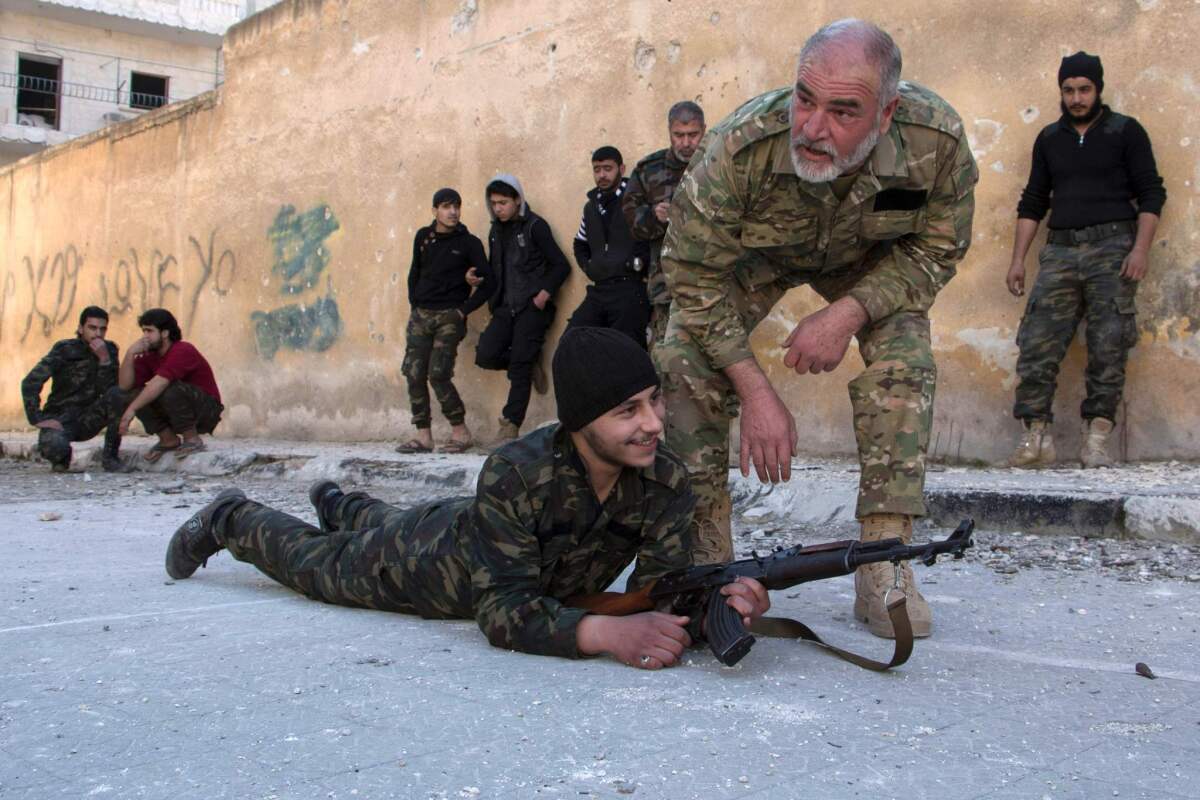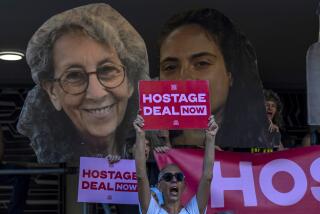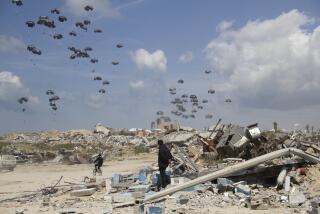Cease-fire in Syria? The warring parties aren’t even talking

New recruits take part in a shooting training session Feb. 16 at a camp in a rebel-held area of the northern city of Aleppo before fighting along with opposition troops.
Reporting from Amman, Jordan — The tortured effort to bring about peace talks in the Syrian civil war suffered yet another setback Friday when a session scheduled for next week was delayed indefinitely.
Friday was also supposed to be the deadline for the start of a “cessation of hostilities” negotiated by the United States and Russia so that urgently needed humanitarian aid could be delivered and a broader settlement negotiated. The warring parties never really expected the cease-fire would take hold, and the deadline passed with no halt in the fighting.
The Syrian army has made new advances in a number of areas in the central province of Homs as well as Latakia province near the Turkish border, the Syrian state-run news service SANA reported Friday.
Join the conversation on Facebook >>
Combat operations also continued in parts of Aleppo province, where Russian warplanes have repeatedly bombed positions they claim are terrorist hideouts but that the U.S. and much of the West say are hospitals and neighborhoods, killing many civilians.
A pro-opposition monitoring group, the U.K.-based Syrian Observatory for Human Rights, with a network of activists on the ground in Syria, reported rebels battled government forces in a number of neighborhoods in Aleppo, Syria’s largest city, which has been split between the government and the opposition since 2012.
The United Nations’ special envoy for Syria, Staffan de Mistura, told a Swedish newspaper that peace talks scheduled for Feb. 25 in Geneva would not take place.
“We need real talks about peace, not just talks about talks,” De Mistura said. “Now the Americans and Russians must sit down and agree on a concrete plan on the cessation of hostilities.” The envoy previously suspended the first effort to bring the warring parties to the negotiating table Feb. 3 because in part of the continued Russian bombing and prevention of aid deliveries.
And it was unclear whether that U.S.-Russian meeting which De Mistura alluded to, of the so-called cease-fire task force. would occur Friday as planned, also in Geneva. The Russian delegation at one point said the meeting had been canceled; the U.S. delegation denied that, saying there merely had been a delay.
State Department spokesman Mark Toner said, as night fell in Geneva, there was still hope a meeting would happen, and that preliminary smaller sessions involving some but not all parties were ongoing.
NEWSLETTER: Get the day’s top headlines from Times Editor Davan Maharaj >>
“Obviously, it’s taken a little while to get to this initial meeting; we’re still not there yet,” Toner said in Washington.
Syrian pro-government forces, backed by hundreds of Russian airstrikes, launched an offensive earlier in February to deny the rebels access to strategic supply routes between Aleppo and Turkey.
The gains by the regime of President Bashar Assad have provoked fears of a full siege of the opposition-controlled section of Aleppo, which is currently supplied by one major highway only a few miles away from government positions.
The basic uncertainty about the proposed cease-fire is that it would allow both the U.S. and Russia to continue airstrikes against “terrorists.” For the U.S., that means the extremist Islamic State; but Russia claims to bomb terrorists who in fact are part of U.S.-backed rebel groups.
The Syrian Observatory for Human Rights also noted Turkey had continued its approximately week-long shelling of a predominantly Kurdish militia, the Syrian Democratic Force, which operates in northern Aleppo. The group, which receives U.S. support to battle Islamic State militants, has recently made inroads against them in the area.
Turkey, however, views the Syrian Kurdish forces as the Syrian proxy of the Kurdistan Workers’ Party, or PKK, with whom it has fought a punishing insurgency war for more than three decades. The Turkish government has vowed to stop any advances made by Kurdish forces in Syria — even if that demands an incursion across the border by Turkish army units.
On Wednesday, a suicide bombing in the Turkish capital, Ankara, that killed 28 people was blamed by the government on the PKK. Responsibility for the attack was later claimed by the Kurdistan Freedom Falcons, a splinter group described by Turkish media as having links to the PKK — further complicating the jumble of forces fighting in the region with competing and conflicting agendas.
The rising tensions have soured relations between Ankara and Washington, which has resisted Turkish demands to create a no-fly zone in northern Syria.
A pro-government Turkish newspaper, Daily Sabah, exhorted the Turkish government to act more aggressively in the wake of Wednesday’s bombing.
“Enough is enough. Wednesday’s attack should be a tipping point in Turkey’s Syria policy,” wrote the paper’s editorial board on Friday.
“Unless our allies are willing to take meaningful action and distance themselves from terrorist groups, Turkey will have no choice but to protect its interests.”
The tensions are also propelling Turkey and Russia on an ever-more-perilous collision course.
Russia on Friday called for an urgent Security Council meeting to protest Turkey’s actions, urging that Ankara “cease any actions that undermine Syria’s sovereignty and territorial integrity.”
Bulos is a special correspondent. Times staff writer Tracy Wilkinson in Washington contributed to this report.
ALSO
U.S. airstrike destroys Islamic State training camp in Libya
Video of a dead city: This is what Syria’s devastation looks like
Pentagon tells Russian military of U.S. special forces’ location in Syria
More to Read
Sign up for Essential California
The most important California stories and recommendations in your inbox every morning.
You may occasionally receive promotional content from the Los Angeles Times.











